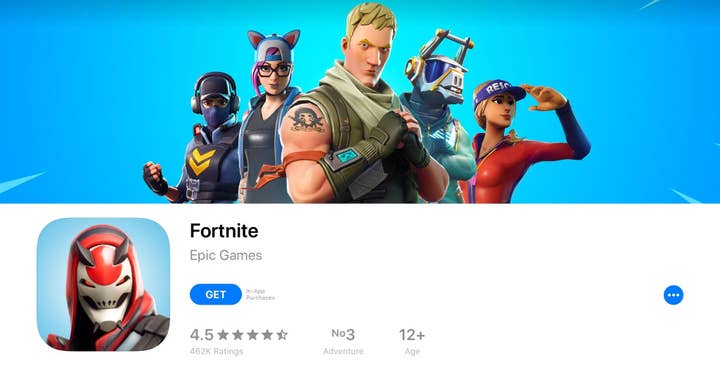Epic vs. Apple is losing PR steam | Opinion
Sensible rulings in Epic's legal dispute with Apple have pared the case back to its core question -- and shown just how disruptive Epic's demand really is
As the rest of the world gears up for next-gen console launches, the legal wrangle between Apple and Epic rumbles on. These kinds of dispute can take years to resolve, of course, but as this one has stretched out and various early injunctions and rulings have been handed down, the whole thing has started to take on the appearance of farce.
The US courts system is, unfortunately, no stranger to being used and abused for the purposes of grandstanding, and from the outset, this case has been as much about PR as about legal argument. As the dispute has been pared down to its core issues by court injunctions, however, public interest has drifted away and some of the legal arguments being made have started to seriously stretch the credulity of even the most mildly informed observer.
This process has been significantly expedited by the judge in the case, Yvonne Gonzales Rogers, who has emerged through her rulings and responses as having both an unusually strong grasp on the technical aspects of what's under discussion, and of the broader state of affairs in the industries it touches upon, with minimal tolerance for chicanery and posturing. All too often in the past, disputes among major technology firms have been able to rumble on for too long simply because the judges involved didn't quite seem to grasp the full implications.
The judge was blunt about how any future ruling in this case is almost certainly going to have a knock-on effect on the console platform holders
Arguments without any real legal credibility were able to shamble on, zombie-like, generating PR for their proponents and consuming the brains of anyone unfortunate enough to read coverage about them in the media. Gonzales Rogers is having none of this; her comments and decisions on the case thus far, as revealed in the court documents, suggest that she's not willing to see her court used as a PR football and will shoot down nonsensical legal claims no matter how much industry or technical jargon they're wrapped in.
One clear example of that is seen in her understanding of the fundamental separation between Epic's Unreal Engine business -- upon which a huge number of game developers and publishers who never asked to be dragged into this legal mess rely -- and the core tussle over Fortnite. By granting Epic's request that Unreal Engine be excluded from Apple's freezing of the company's developer accounts, while also effectively accepting Apple's argument that Epic has the ability to restore Fortnite to the App Store by putting it back in line with the developer agreement it signed up to, and thus does not deserve an injunction preventing its removal, Gonzales Rogers has swiftly focused the case on the central question.
On one hand, this is good for Epic since it protects the Unreal Engine business; on the other hand, the judge's quick decision to move the fight away from any ground on which it could cause collateral damage to other game creators (and Apple's rapid acquiescence to that decision) also pulls the rug out of attempts to frame this in PR terms as the entire industry being threatened by Apple's greed and intransigence.
Things are going to turn sour if companies like Nintendo, Sony and Microsoft start publicly and legally taking Apple's side
What's likely to be even more impactful on how this case progresses, however, is the unsympathetic tone with which Gonzales Rogers has addressed Epic's -- frankly bonkers -- claim that the iOS App Store is in some way legally distinct from the walled garden stores operated by Microsoft, Sony and Nintendo on their consoles. Apple has strongly argued against this position, noting that Epic continues to operate and promote Fortnite on those platforms even as it takes legal action and seeks to stir up consumer sentiment against Apple for running effectively the same business model. In her comments this week, the judge was pretty blunt about how any future ruling in this case is almost certainly going to have a knock-on effect on the console platform holders, and indeed on other storefront operators of various kinds.
This is a big deal, both in legal terms -- you could not unreasonably argue that Epic now effectively finds itself asking a court to rule that the core business model of much of the games industry for decades is unlawful -- and in PR terms, since it radically shifts the incentives for some major industry players to support one side or another of this case. Epic has tried to argue that its lawsuit addresses a situation that's materially different from the console walled gardens for precisely this reason; riling up internet fanboys to rage against Apple is a pretty easy path, but things are going to turn sour if companies like Nintendo, Sony and Microsoft start publicly and legally taking Apple's side.

Epic's central argument for dividing consoles from smartphones on this front is that consoles are different because their hardware profit margins are lower than iPhones, which is... look, I'm not a lawyer, obviously, but having followed and covered cases like this for a long time, this kind of argument stands out as the sort that's devised by someone with a mind for PR who wants to throw out some red meat to fuel online arguments, and not someone who's actually trying to construct a sane legal case.
There are situations where a court is going to care about how profitable a certain product is, but they're pretty limited; in general, as far as the US legal system is concerned, making a good profit margin on something doesn't restrict your legal rights to carry out other business activities as you see fit. There's no line in the sand that says "Sony makes this many dollars on each PS4 so they can have a walled garden, but Apple makes twice as many dollars on each iPhone so they have to let every Tom, Dick and Harry set up their own app stores as they see fit -- with all the security and user experience implications that may bring."
Ultimately, it doesn't seem that having a competent and well-informed judge in this case is playing to Epic's favour
You can make legal arguments against walled gardens in these hardware ecosystems -- I'm not sure the legal arguments are remotely as convincing or solid as the more ephemeral moral and philosophical arguments about platform openness, themselves far less of a slam dunk than the beard-and-sandals brigade often imagines -- but the idea that there's some kind of dividing line between the kind of walled garden Apple runs and the kind that the console platform holders run is just nonsense, and has rightly been upbraided as such (rather more diplomatically) by Gonzales Rogers. If the court ends up ruling that Apple has to take down its garden walls, that ruling may not apply instantly to consoles and other devices, but the precedent will very rapidly be used to apply it in those cases -- and the notion that hardware profitability should make a difference in applying that precedent isn't so much flimsy as outright daft.
This assumes that you could even effectively calculate a per-device profitability that would stand up sensibly in court. How exactly do you divide up and amortise the cost of Apple designing and fabricating its own custom chips, or of Sony developing and marketing expensive, risky AAA games to support its hardware? Nobody is saying iPhones don't make a ton of money, but even if that were legally relevant, quantifying how that differs from the money PlayStations make is a much tougher question than it sounds given the dramatically different ways in which those companies structure their businesses.
Ultimately, it doesn't seem that having a competent and well-informed judge in this case is playing to Epic's favour. The company seemed to rely from the outset on mobilising public opinion and industry support against Apple, but the rulings from the judge thus far have focused things onto the central point of law while making clear just how wide-reaching any ruling on that actual central point of law would be, neither of which really plays well to the peanut gallery. The consumer outrage that Epic may have expected to mobilise once Fortnite disappeared from the App Store and didn't receive the most recent season update has also been a surprisingly damp squib. Even after the PR blitz with which Epic launched its battle against Apple, consumer interest in the situation seemed to drift fairly quickly.
For now, this bandwagon rolls onwards -- but with the comments from the judge making it clear both just how disruptive to the industry as a whole a ruling in Epic's favour would be, as well as just how unlikely such a ruling actually seems to be, it's hard to escape the sense that the wheels are coming off and this issue will never actually see a court resolution. The really unfortunate aspect of this is that there are many legitimate concerns about the size of the revenue share taken by storefront operators like Apple, and a lot of developers would benefit hugely from a proper, positive engagement over how best to encourage creativity and success on these platforms.
Instead, the most likely outcome now seems to be that after bitterly entrenching both sides of the argument, Epic will end up either losing in a way that only cements the situation for even longer -- or just dropping out once it realises that the case has run out of PR steam.

